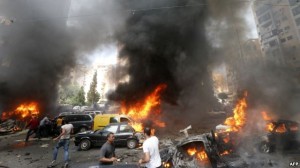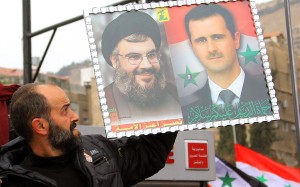Discovering MENA: Hezbollah Under Strain

Talking about politics in Lebanon is always tantamount to wondering about the status of Hezbollah. Meaning “Party of God”, The Economist likes to call Hezbollah a “party-cum-militia”, created within the Shi’a community and funded by Iran during the country’s 1982 civil war with the main aim of offering resistance (muqawama) to the state’s self-declared biggest enemy, who had just invaded the country: Israel.
Its paramilitary wing is still regarded as a resistance movement throughout much of the Arab and Muslim world. Several countries and organizations in the West and elsewhere (U.S., Netherlands, France, Gulf Cooperation Council, U.K., Australia, Canada, the European Union) classify Hezbollah as a terrorist organization, be it in whole or part.
Hezbollah’s 1985 manifesto listed as one of its four main goals giving the people the chance to choose “with full freedom the system of government they want”. Indeed, what started as only a small militia has grown to a political institution with seats in the Lebanese government, a full-fledged PR campaign (including its own museum) and programs for social development.
Many Lebanese, when speaking about the group, refer to it as a “state within a state”. And they are not wrong, as Hezbollah has set itself up throughout the decades as the main provider of both staples, basic services and comfort amongst Lebanon’s Shi’a population.
The height of Hezbollah’s power came on May 25, 2000, when Israel withdrew its armed forces from South Lebanon, which it had occupied since the middle of Lebanon’s civil war in 1982. Following the end of the occupation, its military strength grew significantly and its armed wing is nowadays considered even more powerful than the Lebanese Army.
It is worth noting that Hezbollah wouldn’t exist if it weren’t for the Assad regime next door in Syria: Damascus was the one in charge of supervising the application of the Taif Agreement that ended Lebanon’s civil war, which required the disarmament of all militias in Lebanon, including Hezbollah.
Syria oversaw that disarmament, but Hezbollah didn’t hand over its weapons. The Syrian regime wanted Hezbollah to stick around because of their usefulness against Israel and Beirut. Meanwhile, its political wing is able to mobilize demonstrations of hundreds of thousands.
But now things seem to be changing, mainly as a consequence of the group’s growing involvement in the Syrian conflict and its brutality on the streets of Beirut. Explosions in the country’s capital are not a rare thing for its inhabitants. As of lately, however, the number and proportion of violent attacks is starting to worry more than a few.

Recently, an explosives-laden vehicle exploded in east Lebanon killing its driver and wounding two members from Hezbollah. Twin blasts struck the embassy of Iran – still Hezbollah’s main patron – in Beirut last month. Bombs have also targeted Shi’ite districts of the capital and Sunni mosques in the northern city of Tripoli, where pitched battles break out every now and then leaving behind many dead and, above all, piles of hatred between brethren.
The assassination of Hassan Hawlo al-Lakkis, claimed to be a senior military figure, was an even more clear-cut attack against the militia. Indeed, Hezbollah has been targeted on numerous occasions over its military role in Syria, where thousands of its fighters have been battling with forces loyal to President Bashar Assad against the so-called “rebels”. Many Lebanese Sunni Muslims support the latter, and many Sunni jihadis have even flocked to Syria to join them with the final aim of toppling the Syrian regime.
Hezbollah is witnessing its popularity wane by the minute, not only amongst the Lebanese population, but amongst its own Shi’a community. After the retaking of the city of Qusayr back in June 2013, which caused huge casualties amongst the group’s fighters, many took to the streets to protest against Iran and Hezbollah’s military involvement in Syria. Hezbollah enforcers attacked the crowd with batons and gunfire and left one dead.
In a country still emerging from the ashes of its own incredibly long civil war, the sight of Hezbollah supporters rejoicing over the victories of the Assad regime or firing at protesters frightens many Lebanese, who once revered the organisation as a resistance force above domestic politics.
Many Hezbollah supporters, at the sight of their holy places being attacked across the border, begged to fight on the ground from day one. Nowadays, some Hezbollah officers are refusing to follow orders when they’re told to go to Syria, because for them, this isn’t resistance. It’s not what they signed up for and leaving Lebanon hanging by a thread is tantamount to the weakening of the state.
From a political point of view, the war in Syria is considered by many to be the main reason that is preventing Lebanon from forming a new government, creating a dangerous power vacuum – a government that will never be formed without their approval.
In the international arena, Iran’s nuclear deal apparently means good news for Hezbollah, as it would entail warmer ties with the United States, which might even disentangle from the Syrian conflict, giving leeway to the Syrian regime and thus allowing Assad to remain in power, at least until the next presidential elections.
That calculation certainly does not take into account the proxy confrontation between Saudi Arabia and Iran, which directly affect Hezbollah’s own interests in both Lebanon and the region. Actually, Saudis were the first to be blamed for the bombings in the Iranian Embassy – together with Israel, of course, and despite an Al-Qaeda affiliated Sunni group, Adballah Azzam Brigades, claiming responsibility.

Hezbollah has lost a great deal of ground, failing to keep popular support among independents and the silent majority – something that means a lot in Lebanon. Many Lebanese see Hezbollah leader Hassan Nasrallah’s support for Assad as a miscalculation that will drag Lebanon into the Syrian quagmire, exacerbate fighting in Lebanon itself, limit the country’s ability to contain the growing threat from Sunni extremist groups and deepen Sunni-Shi’ite sectarian rifts in the region. Something that has already proved right in Iraq.
Most Lebanese, including Hezbollah’s supporters, fear sectarian civil war more than anything else. They fear a resumption of the war more than they adhere to their allegiance. And Hezbollah knows full well that its ties with the Shi’a community will keep serving as its first and last lines of defense.
Many even mutter that the move into Syria could also well trigger another war with Israel. An Israel that has now become marginal to the domestic Lebanese discourse, with the three main themes being the Syrian civil war and its effect on Lebanon; the deteriorating security situation and the domestic ethnic Lebanese struggle.
In fact, Nasrallah’s dwindling popularity is a clear example of the issues the group is confronting. Since 1992, when he was appointed to head the group, its Secretary-General has long been revered as the Arab hero who stood up to Israel, and amongst his own as the man who elevated Shi’ites to the top of Lebanese politics. Notwithstanding, he is nowadays being depicted by some as a mere proxy of Iranian theocracy and the protector of the cruel Syrian autocracy that has no qualms in massacring its own people.
A survey conducted by the Pew Research Center published on Jun. 7 showed the decrease of Hezbollah’s popularity in the Arab region following its military involvement in the Syrian conflict.
Even though Nasrallah claims that fighting against Sunni extremists in Syria will spare Lebanon from Sunni extremism, the recent violence shows that Hezbollah’s involvement in Syria is having exactly the opposite effect.
As Foreign Affairs‘ Bolar Saab puts it: “with every bomb that goes off in its stronghold — and with every loss of Shi’a life that is not caused by Israel — the group’s control of its support base will wane”.
WE SAID THIS: Check out Discovering MENA: A Glimpse of Hope for Syria?
